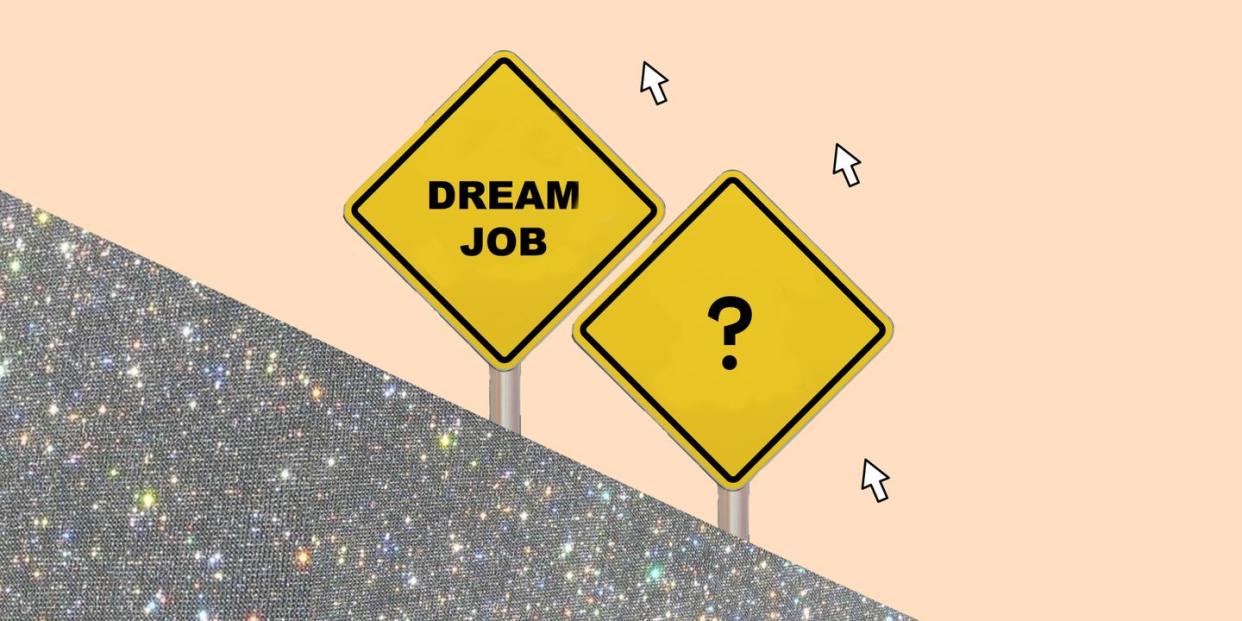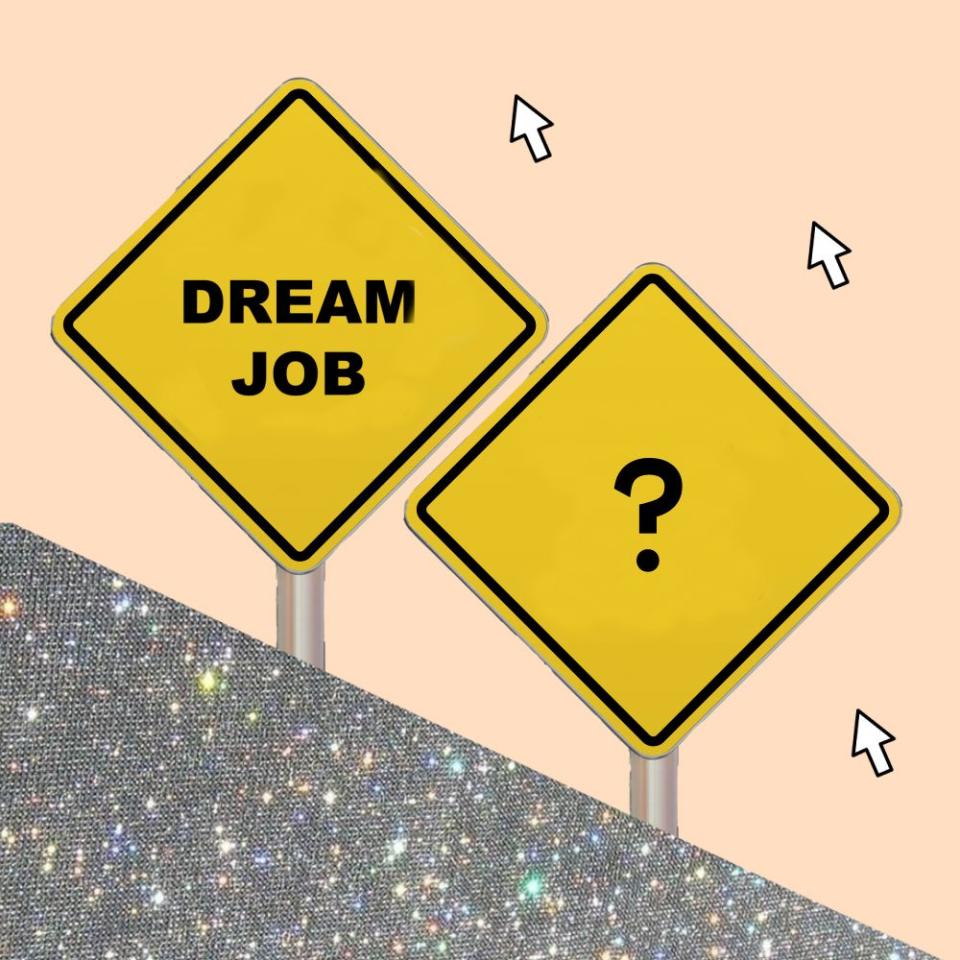What happens when your dream job actually makes you miserable?


Fingers shaking as I spruced my hair on camera, I tried to remember to breathe. I had my smartest jumper on, paired with pyjama bottoms and a big, wavering lump in my throat. It was March 2021, and I was going to quit my dream job as a magazine editor at the age of 27.
I’d always known I wanted to be a writer. Some of my earliest memories are of sitting in my Dad’s study, mesmerised by the music magazine he subscribed to. Stacks of them piled high like skyscrapers around me, and though I couldn’t understand them, I cherished them. I loved the bold words, glossy pages, and colourful photographs of smiling faces.
I wanted to be like them. I wanted to be in a magazine with my words adorning the pages. I carried that dream to University, where I studied English Language (surprise surprise), and became Music Editor of the student union’s magazine.
When I got my dream job writing at a women’s magazine in London, aged 24, I was starstruck. It had been hard work getting to that point; I’d cried, I was skint, and I’d fought hard to be heard, but thriving on the chaotic nature of newsrooms, I wanted more.
I set my sights on becoming an editor, and within two years the title was added to my email signature. I wish I could finish the story here - say I was happy, challenged, content with the knowledge that I’d ticked my dream job off. But sadly, that’s not true.
So how exactly did I find myself on Zoom, mid-pandemic, holding back tears as I told my boss I was quitting? It wasn’t an easy decision for me, far from it - but the cracks started to show within my first year as an editor. I tried to paper over them at first, feeling guilty for not being grateful. Eventually I started to resent waking up every morning to log in. I forced a smile but deep down, I felt tortured.
My days were mostly spent chasing up invoices, doing numbers and spreadsheets. I’d take complaints, sitting next to a draughty fire door, a colleague who listened to the radio without headphones, and a shredder. Any writing successes I had felt short-lived, my career-happiness was stunted, and it was as if I was living in monochrome.
"This can’t be it," I used to tell myself, receiving another pass-agg email with my name spelled wrong (...Ernie, seriously?). I’m not ignorant to know that this comes with most jobs, but this was supposed to be my dream, and instead I was desperately unhappy. I didn’t have it in me to plaster over cracks for much longer.
"But there’s nothing else that I can do," I sobbed to my husband, telling him of my anguish. I’d spent my whole life working up to this pinnacle, climbing this mountain to reach my dream - only to find out that it wasn’t what I expected.
Because I’d spent such a long time striving for the success I had, it was hard to admit it wasn't making me happy. I was respected and admired in my role - strangers sent me messages telling me how inspirational I was. I gave talks about how *great* my so-called dream job was, but really I was miserable. I presented a happy persona online, but it was the complete opposite to how I felt beneath the facade.

“As a society we tie so much value to our jobs. When we get a new role, we’ll often announce it on LinkedIn, have a leaving party and tell lots of people how excited we are. This makes it even more crushing when things don’t turn out how we expect,” career and business coach, Kathryn Monkcom tells me now that I’m reflecting on that time in my life.
Like me, digital PR specialist Gemma, 29, had been “obsessed” with getting her dream job and even messaged the CEO of the company she wanted to work for “begging for a job”. But three weeks after getting her foot in the door of the company, her opinion on the place started to change.
“There was more of a competitive than team vibe,” she tells me - adding she had to be available after hours, on annual leave and over Christmas. “I was so burnt out, anxious and depressed that I had to go back onto my anti-anxiety medication. The expectations were sky high and the goal posts were constantly moving,” says Gemma, who felt disappointed, lost and cried most days at her desk.
She quit just ahead of six months in the role, and while she felt devastated that her dream job turned out the way it did, Gemma doesn’t regret that period in her career.
“I don’t have the ‘what if’ feeling,” Gemma says. “Now I have a better work-life balance and my new team appreciates that our lives don’t revolve around work.”
After around 18 months of sleepless nights, countless deep and meaningfuls with friends and breakdowns with my husband: I also quit my dream job. Like Gemma, I was gutted. The worst thing for me was admitting that I’d broken my childhood dreams. It felt like I’d failed.
I envied my parents for their long-term job security, and felt worried that I’d let down every person who ever told me I was good enough. Kathryn tells me this is totally normal: “A lot of us are scared of letting people down or being seen as ‘job hoppers,’” she explains. “For previous generations, job security was paramount, so leaving a job, however bad, was risky. With the rise of the gig economy, this isn’t so much the case anymore, but it’s a hang up lots of us have inherited from our parents,” she adds.
Freeing myself from my hang ups about letting people down and not having a job for life has been the making of me. Now, I work for myself, I have freedom and I control my time. I write for who I want, and most importantly of all I’m happier than I’ve ever been. Even if this is just temporary, it’s worth it.

I gave up on the idea of having another dream job when I ended that video call with my former boss. I now believe there is no such thing as a dream job, just an overwhelming pressure that we put on ourselves that we have to work towards our own pinnacle, and nothing is an achievement until we succeed in getting there.
What I’m doing is a dream for now, but I know I’d like to work in victim support for the police one day, or become an art teacher. Instead of being on one path to the top, I’m meandering - and Kathryn agrees this is healthy.
“There isn’t just one path for each of us,” she reassures me. “There are a million and one ways to get your dream job, and your dream will likely change over time. Focus on how you want to feel, and you can’t go too far wrong.”
I ditched my dream job, and I couldn’t be happier. It wasn’t the end of me, but the making of the rest of my life.
You Might Also Like

